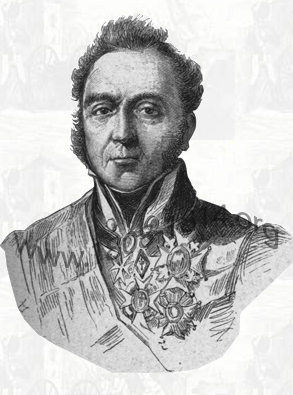Carlos de España facts for kids
Quick facts for kids
Carlos de España
|
|
|---|---|
 |
|
| Born | 15 August 1775 Ramefort (Haute-Garonne), France |
| Died | 2 November 1836 (aged 61) Organyà, Spain |
| Allegiance | |
| Service/ |
|
| Rank | Lieutenant General |
| Battles/wars | Battle of the Gebora (1809) Battle of Albuera (1811) Siege of Badajoz (1812) Battle of Salamanca (1812) Battle of Vitoria (1813) Siege of Pamplona (1813) |
Carlos de España, born in France in 1775, became a very important Spanish general. He was also known as Charles d'Espagnac or Carlos d'Espagne. He earned the title of the 1st Count of España.
Carlos de España is best known for his brave service during the Peninsular War. This was a major conflict in Spain and Portugal. Later, he became the governor of Barcelona.
Carlos de España's Military Career
Fighting in the Peninsular War
Carlos de España was a key figure in the Peninsular War. This war took place in the early 1800s. He fought in many important battles.
He was wounded while fighting at the Battle of the Gebora. He was also injured at the Battle of Albuera. After this battle, he was promoted to a high rank called field marshal.
By June 1811, Carlos de España was a brigadier general. He led the 1st Division of the Spanish army. This division had over 3,400 soldiers.
In March 1812, he was wounded again. This happened during the Siege of Badajoz (1812). He fought under the command of Earl Wellington.
He also fought with Wellington at the Battle of Salamanca. Wellington won a big victory there. Carlos de España's troops were at a bridge at Alba de Tormes. The French army used this route to escape.
After the victory at Salamanca, Wellington made him the governor of Madrid. However, he had to leave Madrid with other troops. This happened when French forces returned to the city.
In 1813, he was wounded once more. This injury occurred during the Siege of Pamplona (1813). He also saw action at the Battle of Bayonne. He was wounded again at the Battle of Vitoria.
After the War
After the Peninsular War, Carlos de España continued his career. His life ended near Organyà, Spain. His body was found in the Segre River.
See also
 In Spanish: Carlos de España para niños
In Spanish: Carlos de España para niños
 | Roy Wilkins |
 | John Lewis |
 | Linda Carol Brown |

